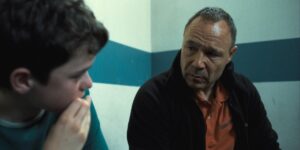Peter Medak’s 1972 black comedy The Ruling Class isn’t the most subtle film, but it’s an excellent one – with Peter O’Toole on fine form.
OUR BEST EVER SUBSCRIPTION OFFER!
Try three issues of Film Stories magazine – for just £1:
right here!

It’s my birthday this Saturday! And to celebrate, I have decided to speak about one of my favourite movies of all time –
The Ruling Class (1972). There is absolutely no other reasons why I am talking about this film. Nope. None at all.
I discovered Peter Medak’s black comedy nearly a decade ago and it hit several of my favourite buttons. A dark comedy with Peter O’Toole that swipes at the upper classes and has some superb musical numbers and a murderous plot? Yes please. No wonder this entered the top shelf of the films that I enjoy.
(Spoiler Alert: I will be talking about the ending so if you haven’t seen it, go. Go watch it now!)
Based on a play by Peter Barnes,
The Ruling Class satirical stage play is as poignant and necessary now as it was back when it was first released. It revolves around the sudden death of the 13
th Earl of Gurney and how his son, Jack Gurney is set to take his place.
However, Jack believes himself to be Jesus Christ. When he arrives back home, Jack wants to spread his message of peace and free love, much to the chagrin of his wealthy elitist family. Following his return, his uncle Sir Charles and his wife Lady Claire conspire with Jack’s psychiatrist Dr Herder to have him cured…or curtailing to their own views. It leads to disastrous consequences.
Peter O’Toole leads the brilliant cast as Jack Gurney. O’Toole is obviously one of the most incredible actors to ever grace our screens and stages, but I think his role here is the greatest. Grappling with many different facets of Gurney, O’Toole is superb. In the beginning, he plays Gurney lighter than air, skipping through his scenes with pure love and excitement for living. O’Toole is marvellously wry – delivering impeccable lines such as “when I spoke to God, I found that I was talking to myself,” with absolute aplomb.
Then halfway through the film, it twists and a darker films emerges with horrifying implications. After an experimental treatment by Dr Herder seems to have worked. Jack no longer believes himself Jesus Christ. In fact, he seems fine – calm and collected with all those silly notions of being the Lord Saviour put behind him.
However, in a chilling monologue it is revealed that Jack thinks himself a different entity – Jack the Ripper, sent forward in time to smite the wicked from earth. After this revelation, despite the family seemingly unaware, Jack’s opinions on society become more sickening and yet the upper classes invite him in because finally he is seeing the world how they see it. A sequence after a fox hunt leads to the most shivery rendition of Dem Bones you have ever heard.
Peter O’Toole masters this change very well, and the utter change of character is naturally handled, which makes it even more devastating when his views turn into action.
Upon first release,
The Ruling Class split critics. Many saw it as fun and caustic whilst others accused it of being slow and shrill. I will admit that the satire is heavy-handed, and wallops you (metaphorically) over the head with the concept. The idea of aristocracy openly welcoming a serial killer over the biblically accurate depiction of Christ is on extremely on the nose. But it has to be because this theatrical cinematic extension of the play revels in the eccentricity of the tale. It is over the top for good reason because when the insidious nature of Jack’s second murderous personality weave through the second half, it strikes deeper and harder.
Though it may have started as a commercial failure
, The Ruling Class has become cult classic, and many have revisited the story over the time with more reverence than upon first release. The play itself was brought back to the West End by Jamie Lloyd with James McAvoy as Jack Guernsey (the actor was nominated for an Olivier.)
I keep thinking about the very last scene. It is the most horrifying. It strikes fear into the hearts of anyone who has seen the country transformed into an ugly, fascist, elitist machine where the rich are the most depraved and would do anything to propel their agenda forward.
Fifty years on,
The Ruling Class feels more significant than ever.
—
Thank you for visiting! If you’d like to support our attempts to make a non-clickbaity movie website:
Follow Film Stories on Twitter here, and on Facebook here.
Buy our Film Stories and Film Junior print magazines here.
Become a Patron here.







